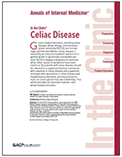
In the Clinic is a monthly feature in Annals of Internal Medicine introduced in January 2007 that focuses on practical management of patients with common clinical conditions. It offers evidence-based answers to frequently asked questions about screening, prevention, diagnosis, therapy, and patient education and provides physicians with tools to improve the quality of care. All ACP members and Annals subscribers have full access to this content.
Cardiac Amyloidosis
Amyloidosis is a pathologic and clinical condition resulting from the accumulation of insoluble aggregates of misfolded proteins in tissues. Extracellular deposition of amyloid fibrils in the myocardium leads to cardiac amyloidosis, which is often overlooked as a cause of diastolic heart failure. Although cardiac amyloidosis was previously believed to have a poor prognosis, recent advances in diagnosis and treatment have emphasized the importance of early recognition and changed management of this condition. This article provides an overview of cardiac amyloidosis and summarizes current screening, diagnosis, evaluation, and treatment options.
Read this issue of In the Clinic.
Chagas Disease
Chagas disease, which is caused by infection with the parasite Trypanosoma cruzi, is a leading neglected tropical disease in the United States. An estimated 240,000 to 350,000 persons in the United States are infected, primarily immigrants from Mexico, Central America, and South America, where the disease is endemic. The parasite is transmitted by the triatomine bug but can also be passed through blood transfusion, via organ transplant, or congenitally. Approximately 30% of infected persons later develop cardiac and/or gastrointestinal complications. Health care providers should consider screening at-risk patients with serologic testing. Early diagnosis and treatment with benznidazole or nifurtimox can help prevent complications.
Read this issue of In the Clinic.
Back to the March 2023 issue of ACP Global

